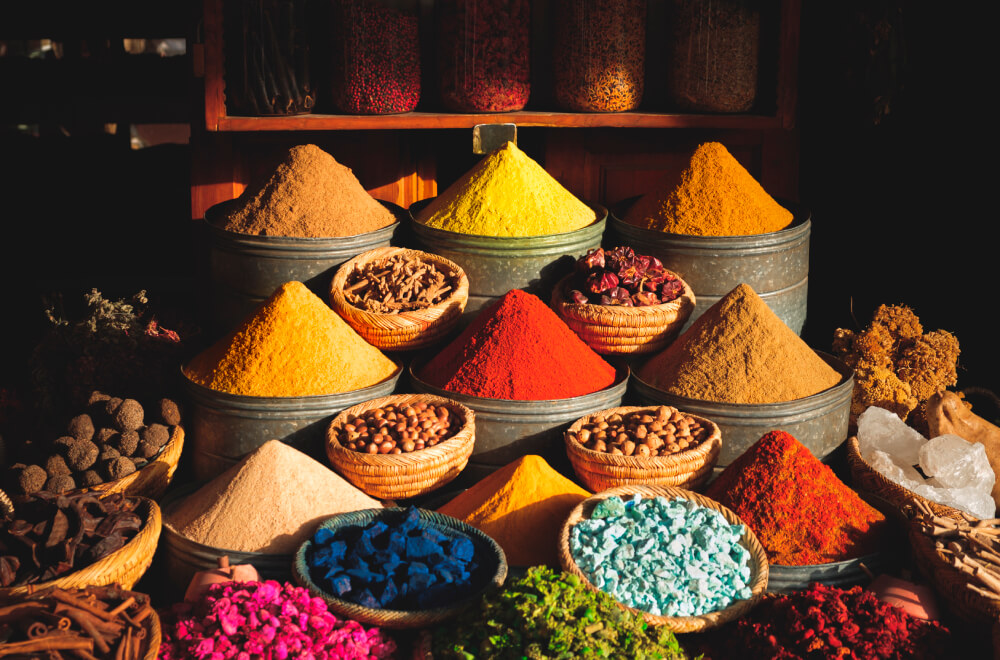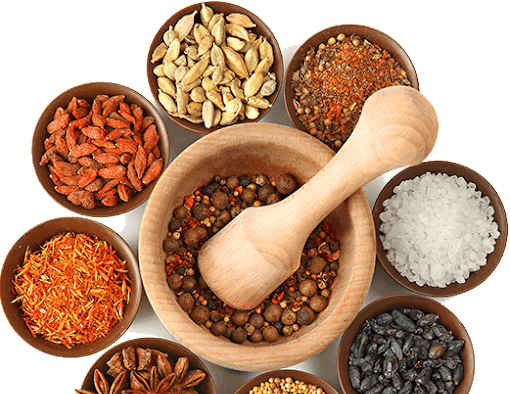According to an Assyrian myth detailing that the gods drank sesame wine the night before they created the Earth, herbs and spices were here before we were!
More reliable sources, dating from about 2,600 BC note that the labourers who built the Great Pyramid of Cheops were fed spices to give them strength. Not long after, the ancient Syrians began using cloves, and Egyptian embalmers made frequent use of cinnamon; over a thousand years before Prince Vijaya, the legendary founder of the Sinhalese race set foot in Sri Lanka, our island was already part of a sophisticated international trading network.
As it evidently has always been, the global spice trade has supported complex chains of carriers and middlemen and is richly interwoven with the history of the world and stories of empires that have both risen and fallen around it.
Trade Secrets and Travelers’ Tales
Asians and North Africans seem to have used spices – some home-grown, others imported – since the dawn of history, but the spread of civilization to Europe in the first millennium BC created a whole new source of demand, one that never seemed to stop growing.
Ancient Egyptians used spices in a wide manner of ways, making their country possibly the biggest market for these goods in the ancient world. It is no coincidence that the travelling merchants to whom the Hebrew prophet Joseph was sold by his brothers were spice merchants en route to Egypt. Spices were precious, a source of potentially immense wealth. The Bible relates that when the Queen of Sheba came to court King Solomon, her gifts to him included gold, precious stones – and spices.
Greeks and Persians involved themselves in the trade, travelling as far as India and Sri Lanka (where the ancient, still-functioning seaport of Galle has been identified by some as the Biblical Tarshish) to do business. The main beneficiaries of European demand for spices, however, were the Arabs. The principal route between the spice-growing lands of Asia and the countries of the Mediterranean lay across the Arabian Peninsula, whose inhabitants took full advantage of their geographical good fortune.
Arabs became the gatekeepers of the spice trade. To put inquisitive Greeks and Romans off the scent, they made up fabulous tales about the origins of the spices they dealt in – such as the claim, credulously repeated in Herodotus, that cinnamon grew on the tops of mountains, jealously guarded by giant birds. The Romans, despite the massive wealth of their empire, deeply resented the expense of the Arab spice monopoly and went to great lengths to break it. First, they attempted to invade Arabia and when that failed, they went exploring, and discovered how to sail to India and back making use of the monsoon winds. Navigation succeeded where conquest had failed: The Romans – possibly the world’s greatest-ever consumers of spices and fragrances – took over the international trade.
However, the triumph of Islam saw the return of Arabs to dominance in the spice trade, a position they maintained for the next seven hundred years.
The Spice Empires
What happened after that is well known. As Arab power declined, that of Europe rose. European navigators set out to discover the mysterious lands where spices grew. Vasco da Gama sailed round Africa, finding a route to the ‘Indies’ that the Arabs couldn’t block; after him came a host of explorers – Portuguese, Dutch, French, English. Unable to compete against Western seafaring and military technology, the Arabs retired, leaving the field to the Europeans. The new masters of the trade fought amongst themselves for dominance. Every spice island and trading post was a prize worth any number of lives, for spices had lost none of their value over the centuries; indeed, if anything their value had increased. Monopolies were fiercely protected. The Portuguese and Dutch tried to prevent the export of nutmeg from the Moluccas; Pierre Poivre, a French colonial official, risked his life to smuggle nutmeg and clove seedlings from those islands to Mauritius. His name, translated into English, is immortalized in the nursery-rhyme that chants: Peter Piper picked a peck of pickled peppers.
Huge European fortunes were amassed in pepper, cinnamon and cloves; wars were fought and unspeakable atrocities committed for the sake of the trade; and by it, Europe acquired her vast world-spanning empires, which she held to until the middle of the twentieth century.
Spice World
Globalization may be a buzzword today, but it began thousands of years ago with the spice trade. It was travelling spice merchants who carried cultural influences – tastes, manners, ideas, beliefs, craft skills, folk tales and so much more – between the kingdoms of the Old World. The trade supported the rise of the Western Europe to achieve world dominance, bringing about the next stage of global integration. The tightly-bound, multicultural global society we live in exists in large measure because of spices and the demand for them – and spices thrive in our globalized world as never before.
Tastes travel, mix and mingle; every big city now boasts restaurants featuring popular cuisines from all over the world: Chinese, French, Indian, Italian, Mexican, Middle Eastern, Thai and many others, each with the spices typical to the cuisine, and methods of preparation that give it character. In our homes too, we have become more adventurous, experimenting with new ingredients, trying out exotic dishes on our guests, making full use of the expanded pantry of spices and condiments that the global trade has made accessible and affordable to us.
Now, in the twenty-first century, everyone is a gastronomic cosmopolite. Spices, it seems, bring out the best not only in food, but in people: sensuality, a taste for variety, willingness to experiment, empathy with other races and cultures, a spirit of adventure and much more. Spices have helped shape the world we live in and the kind of people we are, and they continue to give our lives richness and flavour.
In retrospect, the old Assyrian myth really isn’t far from the truth.



